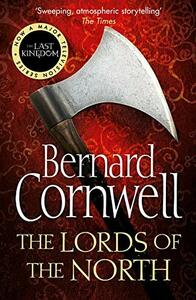You need to sign in or sign up before continuing.
Take a photo of a barcode or cover
adventurous
informative
tense
fast-paced
Plot or Character Driven:
Character
Strong character development:
Yes
Loveable characters:
Yes
Diverse cast of characters:
Yes
Flaws of characters a main focus:
Yes
adventurous
emotional
tense
fast-paced
Plot or Character Driven:
Character
Strong character development:
Yes
Loveable characters:
Yes
Diverse cast of characters:
Yes
Flaws of characters a main focus:
No
Book three of the saxon tales series, and probably the best one I’ve read so far. The main character is much better developed and fleshed out in this book, mainly due to his experiences during the books event. The last two chapters are particularly good and both are climactic endings that are teased throughout the book. By the end I definitely found myself cheering for the main character. It gets me very excited to see what comes in book four, and if I’m learning anything, it’s that this series gets better with each book.
adventurous
dark
medium-paced
Plot or Character Driven:
Character
Strong character development:
Yes
Loveable characters:
Complicated
Diverse cast of characters:
Complicated
Flaws of characters a main focus:
Complicated
adventurous
medium-paced
Plot or Character Driven:
A mix
Strong character development:
Complicated
Loveable characters:
Yes
Diverse cast of characters:
No
Flaws of characters a main focus:
Yes
adventurous
fast-paced
Plot or Character Driven:
Plot
Strong character development:
No
Loveable characters:
Yes
Diverse cast of characters:
No
Flaws of characters a main focus:
Complicated
I love The Last Kingdom TV show, but the writing in this just makes not love reading it
Historical fiction is among my favorite genres. One period that I'm particularly interested in is ninth and tenth century England when the country as we know it was in its birth pangs. It was a violent time when Danes and Norsemen made frequent raids on the land, pillaging, killing, raping, but some of them actually stayed and settled there and became a part of the formation of a new society.
My interest in this period explains how I came to be reading Bernard Cornwell's Saxon Stories. His are action adventures, full of blood and guts. Not exactly the reading fare that I normally turn to, but good, well-researched historical fiction can often give us insight into the real history of a period and place.
I can't really fault Cornwell's research. The stories are based on real events and people. But the unrelenting violence and the lack of any significant character development leave me unsatisfied. I need to take a break from the series for a while. Perhaps I'll come back to it later.
Lords of the North is the third entry in the series. It continues to follow Uhtred, the rightful lord of Bebbanburg, as he heads north toward his ancestral home after helping Alfred overcome his enemies in Wessex. Alfred is now more firmly in control and reaching out to those who hold sway over other parts of the country, seeking to solidify his rule.
Uhtred, on the other hand, dreams of revenge against the enemies who stole his birthright. His oldest enemy, Kjartan, known with good reason as "The Cruel," is first in his sights. Kjartan had killed Uhtred's revered adoptive (Dane) father, Ragnar, and had stolen his beloved adoptive sister and made her a whore. But there are other enemies as well. Uhtred has his work cut out for him.
But wait! Before he can proceed on his vengeance tour, he is betrayed and sold into slavery. He spends two years at the oars of a trading ship under the whip of a cruel master, just adding more enemies to his long list.
Finally, he is rescued and freed by a mission led by Ragnar the Younger, his adoptive brother, last seen as a hostage with Alfred and now sent by Alfred to find Uhtred.
So, Uhtred and Ragnar team up with the "king" in that part of the country, Guthred, and plan an attack against the stronghold of Kjartan.
Guthred is a charming but weak king. He allows himself to be bullied by the monks because he sees Christianity as a powerful kind of magic. Alfred wants to make him an ally and so Uhtred's aiding him continues to put him in the service of Alfred, whom he despises.
The rest of the tale is taken up with the taking and killing of Kjartan and reordering the political map of the now conquered lands.
Uhtred is a warrior who relishes war and glories in the beheadings and disembowelings that are a part of shield warfare, as well as the torture and slow deaths of his enemies. The story is told by him. He is looking back on his life from some point in the future. During the events here, he is still only in his very early twenties with all the brashness and arrogance of youth and the belief in his own invincibility. As a narrator, he is unable to give us a broad and objective, even-handed view of ninth century England. The reader is led to wonder if, as the series progresses, Uhtred may grow in wisdom and understanding of the world and offer us a more even-tempered and equitable perspective of it. Perhaps I'll find out. Someday.
My interest in this period explains how I came to be reading Bernard Cornwell's Saxon Stories. His are action adventures, full of blood and guts. Not exactly the reading fare that I normally turn to, but good, well-researched historical fiction can often give us insight into the real history of a period and place.
I can't really fault Cornwell's research. The stories are based on real events and people. But the unrelenting violence and the lack of any significant character development leave me unsatisfied. I need to take a break from the series for a while. Perhaps I'll come back to it later.
Lords of the North is the third entry in the series. It continues to follow Uhtred, the rightful lord of Bebbanburg, as he heads north toward his ancestral home after helping Alfred overcome his enemies in Wessex. Alfred is now more firmly in control and reaching out to those who hold sway over other parts of the country, seeking to solidify his rule.
Uhtred, on the other hand, dreams of revenge against the enemies who stole his birthright. His oldest enemy, Kjartan, known with good reason as "The Cruel," is first in his sights. Kjartan had killed Uhtred's revered adoptive (Dane) father, Ragnar, and had stolen his beloved adoptive sister and made her a whore. But there are other enemies as well. Uhtred has his work cut out for him.
But wait! Before he can proceed on his vengeance tour, he is betrayed and sold into slavery. He spends two years at the oars of a trading ship under the whip of a cruel master, just adding more enemies to his long list.
Finally, he is rescued and freed by a mission led by Ragnar the Younger, his adoptive brother, last seen as a hostage with Alfred and now sent by Alfred to find Uhtred.
So, Uhtred and Ragnar team up with the "king" in that part of the country, Guthred, and plan an attack against the stronghold of Kjartan.
Guthred is a charming but weak king. He allows himself to be bullied by the monks because he sees Christianity as a powerful kind of magic. Alfred wants to make him an ally and so Uhtred's aiding him continues to put him in the service of Alfred, whom he despises.
The rest of the tale is taken up with the taking and killing of Kjartan and reordering the political map of the now conquered lands.
Uhtred is a warrior who relishes war and glories in the beheadings and disembowelings that are a part of shield warfare, as well as the torture and slow deaths of his enemies. The story is told by him. He is looking back on his life from some point in the future. During the events here, he is still only in his very early twenties with all the brashness and arrogance of youth and the belief in his own invincibility. As a narrator, he is unable to give us a broad and objective, even-handed view of ninth century England. The reader is led to wonder if, as the series progresses, Uhtred may grow in wisdom and understanding of the world and offer us a more even-tempered and equitable perspective of it. Perhaps I'll find out. Someday.
Very funny! A plot-driven, gripping historical tale about Uhtred's determination to settle his bloodfeud with his uncle who betrayed his father and stole his birthright. Along the way he meets new comrades and faces new adversaries. A brilliant read for all those partial towards historical fiction and Game of thrones!





